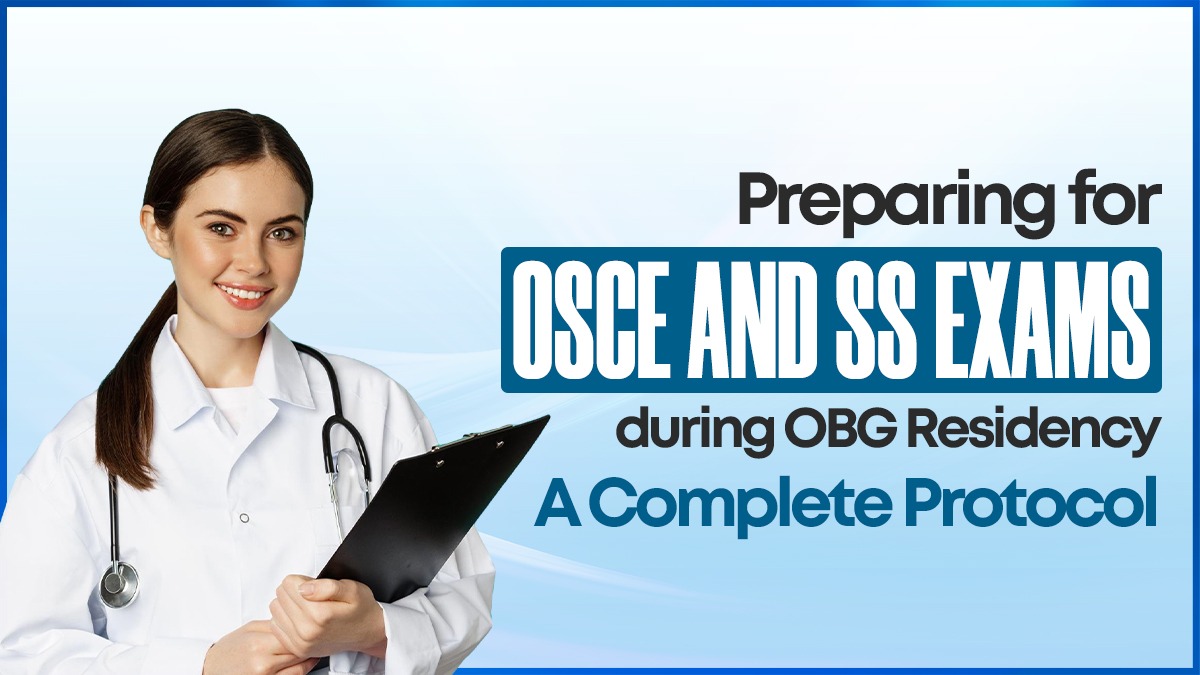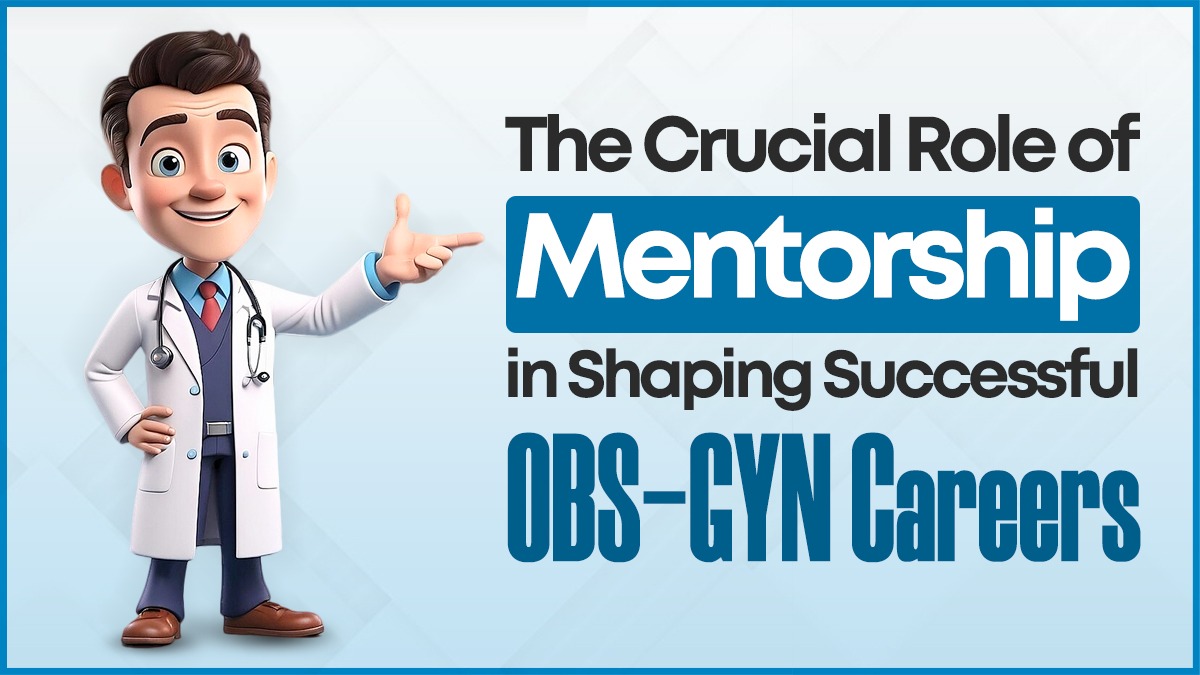Estimated reading time: 6 minutes
You’re starting a thrilling and demanding course of obstetrics and gynecology residency. Your OBS-GYN Residency is not just about on-the-job training but also exam preparation for all those relevant exams in your specialty, including the OSCE and SS Exam. This blog post will take you through some working strategies for managing residency tasks and exam preparation in order to ensure you’re fully prepared to deliver in both areas.
Understanding the Exams
As a precursor to answering how to prepare, let’s just briefly touch on the exams that you’ll encounter in your obstetrics gynecology residency program.
- OSCE: An Objective Structured Clinical Examination that tests your clinical skills in handling practical case scenarios.
- SS Exam(Super Specialty Exam): which tests your expertise and detailed knowledge of obstetrics and gynecology.
- MS Exam and DNB Exam: Not the theme of this post, these are also significant milestones in your career for which you would need dedicated MS Exam Preparation and DNB Exam Preparation.
Equilibrium Between Residency and Exam Preparation
1. A Schedule for Study
Proper time management will be central in your ob gyn residency programs. Create a realistic schedule of study that allows you to cover your syllabus within the same frame, which will allow you to fulfill your regular residency duties. Identify certain slots for studying, clinical practice, and resting.
How Conceptual OBG can help: Conceptual OBG offers a monthly schedule, crafted with residents in mind. This schedule fills all the space you have available in your residency, so you study everything that really counts without having to sacrifice your clinical duties.
Focus on High-Yield Topics
2. Prioritize High-Yield Topics
Focus on high-yield topics that are commonly tested within the OSCE course and SS Exam. Approach senior residents or faculty members to identify these areas and spend more time
on those.
How Conceptual OBG helps: Our expert faculty has readied a list of high-yield topics following recent exam patterns. Our live lectures and recorded video lectures are designed around the most crucial areas, ensuring that you are very well prepared for the most important areas on the exam.
3. Optimize Use of Downtime
Attempt quick revision or reading during downtimes. Use pocket guides or digital resources, which are within an arm’s reach.
How Conceptual OBG assists: Conceptual OBG’s mobile app lets you access neatly formatted study material to learn during downtime. Our “OSCE Question of the Day” series is perfect for rapid reviews in a busy schedule.
4. Integrated Learning Approach
Combine your clinical experiences with the theoretical study to reinforce your understanding and improve retention.
How Conceptual OBG helps: Live lectures usually consist of case discussions that connect between theory and practice. The faculty bases their teaching experiences, and as you come to understand that, you can relate them well to your clinical experience and what is relevant to the exam.
5. How is Self-Assessment regularly done?
Test your knowledge regularly for gaps to note in the progress.
How Conceptual OBG helps: As well as our “OSCE Question of the Day” series, Conceptual OBG has provided on a regular basis mock tests and self-assessment modules to help you gauge how prepared you are and focus your energies in the right directions.
With these resources here from Conceptual OBG, you can find a better harmony in your residency duties and the necessary preparation for exams. We take a structured approach, with expert-curated content and flexible learning options, tailored to help succeed throughout time in OBG residency, thereby satisfying needs for clinical skills and exam performance.
Essential Resources for Exam Preparation
1. Must-read Books
Buy quality books covering the entire curriculum. Books to read for SS Exam Preparation Must Haves are:
- Williams Obstetrics
- Berek & Novak’s Gynecology
- Te Linde’s Operative Gynecology
For the OSCE courses, books based on clinical scenarios and patient cases.
2. Internet-based Resources and Tools
There are various internet-based resources that provide comprehensive tools for one to prepare for the obstetrics and gynecology residency program exam. Some of these online resources include;
- eBooks
- Live Lectures
- Online question banks based purely on OB-GYN
3. Study Groups and Peer Learning
Make study groups with other residents. You can benefit from debating discussions, case presentations, and mock OSCE sessions.
Acquiring Clinical Skills at the Same Time
1. High activity of clinical rotations
Utilize your time in clinical rotations properly. Be highly interactive during patient care, procedures, and case discussion. This will provide you with indispensable skills for the OSCE course as well as your professional life as an OB-Gyn.
2. Simulation Training
Many Obstetrics Gynecology Residency Training Programs have simulation labs. Utilize such facilities and practice procedures to enhance your clinical acumen in an orderly manner.
3. Case Presentations and Journal Clubs
Attend case presentations and journal clubs. These will keep you updated on the latest research and enhance your ability to analyze and present clinical information.
Conceptual OBG, the right Platform to Guide Your Post-Residency Journey
Conceptual OBG, eConceptual is a treasure trove in your residency in OBG. The unique features for making you a topper will be offered by it to you as follows:
- Faculty-assisted learning through teaching: The power of learning from the best in OBG is unmatched. Our veteran faculty provides rich clinical exposure and knowledge that goes beyond textbooks.
- Flexibility: A mix of live lectures and on demand content allows you to learn at your own pace, fitting in around your commitments as an OBG resident.
- Interactive Learning: Interact with challenging medical concepts through case studies, 3D models of anatomy, and flowcharts of treatment pathways. Engage with faculty and peers in expert-moderated forums to cement learning.
- Broad Range: From Fundamental Concepts to High-Level Clinical Skills and Best Practices in Contemporary OBG.
- Exam Preparations: Prepare for SS Exams using advanced question bank, time-bound mock exams with detailed analytics on performance.
Unlock your full potential with us
Premium Plan Features:
- Live lectures in the APP
- Video Lectures
- In-app Notes
- Conceptual OBG books
- Live Case Discussion
- Live Mock examinations
All these features are to help you through your OBG residency and beyond.
Do’s and Don’ts for Effective Preparation
Do’s:
- Maintain a study routine
- Regular practice of mock OSCEs
- Keep yourself updated with the latest in OB-GYN guidelines and research
- Take care of your physical and mental well-being
Don’ts:
- Never compromise on your clinical responsibilities at this preparation time
- Don’t cram at the last moment
- Do not isolate yourself; try to be around people, discuss with others, and learn from your mentors
Conclusion
Preparing for the OSCE course and SS Exam during your OBS-GYN Residency Programme is indeed challenging but rewarding. By acting systematically, using the right sources of information, and balancing time with clinical and study responsibilities, you are put in excellent position to excel both in residency and in exams. Remember that you are doing more than just passing this set of exams: you are training for a life as competent and knowledgeable obstetrician-gynecologist. Keep focused, keep curious and delight in the learning experience during your obstetrics and gynecology residency.
All the very best for your MS Exam, DNB Exam, and SS Exam.



